- Home
- Q. Patrick
Death for Dear Clara Page 5
Death for Dear Clara Read online
Page 5
“Inspector,” he said thoughtfully, “these poems are distinctly third-rate.”
Jervis made no reply. He was watching the fingerprint man who had started to examine the knife. Like most of his colleagues, Jervis had a very definite point of view with regard to Timothy. This odd young man got results (probably through luck), but he was mildly nuts most of the time, and could safely be ignored when he started to make irrelevant remarks.
“Possibly even fifth-rate,” continued Timothy impassively. “You can take the word of Princeton’s least distinguished English scholar that this stuff is too bad ever to get published. In fact, it’s lousy. If this is the sort of material Mrs. Van Heuten handled, she couldn’t have made much money.” Once again the lazy gray eyes moved around the room. “And yet, this is a very expensive office in a very expensive building, and there’s that diamond ring. It’s big enough to choke the proverbial goat.”
Jervis grunted. “Society dames don’t go into business to make money,” he explained patiently. “They’ve got it already. Business is just a hobby.”
“But,” said Timothy, “I happen to remember that Mrs. Van Heuten was flat busted five years ago when her husband died. All that she now owns, she must owe to her darling Literary Advice Bureau.”
“What the hell you driving at?” Jervis was interested.
“Just that Mrs. Van Heuten seems to have put a lot of feathers in her nest, and, if she did it through selling poems like this, she was a better business man than Mr. Mellon.”
The problem of Mrs. Van Heuten was beginning to intrigue Timothy. Nothing about her was quite right.
He glanced through the remaining manuscripts in his hand. He gave a little grunt of surprise. Slipped between the pages of a very incomprehensible short story was a single sheet of paper. It was dated that day and written across it in Mrs. Van Heuten’s flourishing, feminine handwriting, were the words:
“I, Clara Houston Van Heuten do hereby dec …”
For a second, he gazed at it; then he flicked it to the inspector.
“Something your boys overlooked, Jervis. The traditional document in the case.”
As he read, the expression on the inspector’s face turned to one of incredulity and excitement.
“By golly, Trant, I think you’ve got something! She must have been writing that this afternoon and slipped it in those manuscripts because she was interrupted …”
“Probably by the murderer,” offered Timothy.
“I, hereby dec …” Jervis’ bushy eyebrows lowered in a frown of concentration. “Maybe you are right at that. Maybe there is more than a sneak-thief in this. Looks like the beginning of a will to me.”
“It does,” agreed Timothy absently.
“And when a healthy and not-so-old woman starts making a new will it’s usually because she’s either mad at someone who benefited in the old will or—”
“She’s afraid she’s going to die,” suggested Timothy. “Or, perhaps, because she was afraid she was going to get murdered.”
He turned away and started to run through the letters which Madeleine Price had left in the wire basket. Business correspondence and a few bills with checks attached. He put them down and rummaged in drawers until he found Mrs. Van Heuten’s check book. He skimmed through the stubs, paused over one and glanced at a plain-clothes man who was on his knees gloomily peering under the desk.
“You looked this place over, Mac?”
“Skimmed it.”
“Find any checks lying around?”
“Only what was in that basket.”
“Oh.” Timothy seemed puzzled. “Inspector, can I see that list of people who came here today?”
When the inspector handed it to him, Timothy read through it swiftly and gave a curious smile. “Very interesting,” he said. “This case seems absolutely crawling with clues.”
“What’ve you got now?” queried the inspector, still rather rattled by Timothy’s production of the unfinished document.
“I don’t know.” Timothy put check book and letters into his pocket. “But I think it’s something else rather unusual. I’ll keep the secretary’s efficient little list, too, if I may.”
Both he and the inspector turned at a sardonic growl from the fingerprint man. He had unbent from the knife and was staring down at it in mock astonishment.
“Well, what the hell!” he exclaimed. “I’ve been looking for fingerprints on knives for the past ten years, but this is the first time I ever found any.”
The plain-clothes man, the cameraman, the medical examiner and the inspector crowded around him eagerly.
“He actually left prints?” exclaimed the inspector as though shocked at such sloppiness on the part of a murderer.
“She actually left prints,” corrected the fingerprint man. “It’s a dame’s prints. Not a trace of anything else on the knife, either. First I thought they might be Mrs. Van Heuten’s, but they don’t check. And it isn’t that secretary, I took a good look at her hands when I came in. She’s got splay fingers, like a man. These prints are small—almost like a kid’s.”
“A break,” said Jervis grimly. “A break.”
Timothy alone had not seemed particularly interested in this startling development. He stood very still, gazing out through the elaborately curtained window.
“I,” he announced, “am going to have a talk with that secretary.”
“Send her in here first,” snapped Jervis. “Better check on her fingerprints anyway.”
Timothy moved to the door. On the threshold he paused.
“A woman’s fingerprints, an unnecessary and unlocked back door, very bad manuscripts, very expensive offices and an unfinished document strongly resembling a will. Rather too much of a good thing, eh, inspector?”
He grinned.
“Maybe we are going to need some fancy tricks on this case—after all.”
V
In the outer office, Timothy found Madeleine Price sitting, pale and erect, in a chair. He grinned at her.
“The law is hungering for your fingerprints, Miss Price. You’d better go and deliver.”
When, rather shakily, the girl disappeared into the inner office, he dropped into the chair she had vacated. He wanted a few minutes alone, to think. Already he had unearthed several potentially mysterious factors with regard to the death of Mrs. Van Heuten. But it was too early to start worrying about them.
While Timothy did not claim the psychic or psychological insight of a super-sleuth, he had an obstinate belief in his personal reactions to people. He had disliked Clara Van Heuten when he had met her at his mother’s house. What was it about her that he had disliked? If only he could figure that out, he kept reflecting bull-headedly, it would be worth more than a hundred more material clues.
He was still holding in his hand the typewritten list of visitors to the Bureau that afternoon. Jervis was probably right about them. The times of their arrivals and departures indicated that they had all left the scene of the crime before the murder. Although any of them could have returned again through the back door, there was no real point in suspecting them any more than anyone else in New York. And yet they intrigued him. One name in particular stood out. Robert Bristol. Surely he knew a Robert Bristol. And then the Princess Walonska, Beatrice Kennet, Gilda Dawn and Susan Hobart, admitted together. Why on earth should four such amazingly incongruous celebrities have paid Mrs. Van Heuten a mass visit? Could each and all of them have succumbed to a sudden and simultaneous desire for literary advice?
Madeleine Price came out of the inner office.
“Well, Miss Price, are they going to arrest you?”
The secretary sat down behind her desk. “They just took my fingerprints.” Then she added bluntly: “They were kind enough to tell me I have unusually large hands.”
Gravely Timothy leaned over the desk and took one of her hands. “They’re very nice hands, Miss Price.” His gray eyes rose to hers. “But they’re trembling.”
“And why sho
uldn’t they be?” The girl snatched her fingers away indignantly. “Wouldn’t your hands be trembling if—if you’d just discovered a murder?”
Timothy had been interested in Madeleine Price from the first moment he saw her. He was even more interested now. He could not remember ever having seen a girl quite like Mrs. Van Heuten’s secretary. Actually about twenty-five he guessed, but dressed in the style of a much older, far less attractive woman. No make-up; hair unnecessarily spinsterish; not the slightest attempt at allure.
And yet, despite the deliberate austerity, there was something fundamentally attractive there. Remarkable eyes, he thought. Superb control, too. Had it not been for that brief contact with her hand and an occasional flickering of her eyelids, he would never have guessed that she was afraid. And yet, he knew now that she was afraid—afraid with an intensity that surprised and perplexed him.
“Don’t be deceived by the shirt, Miss Price,” he said with a disarming smile. “It’s just another disguise to gild the dumb cop.”
He laid the list of visitors down in front of her.
“This list of yours interests me, Miss Price. It proves that we have at least one vice in common. We both hit the three-quarter key on the typewriter instead of the period.”
Madeleine Price’s face was studiedly expressionless. “Are you trying to put me at my ease?”
“I was just deducing that since you type almost as badly as I do, you must be new to business offices.”
Tersely, Madeleine explained the reasons for her presence in the Literary Advice Bureau—her niece’s illness and her sister’s enforced but temporary absence.
“I see. Now, Miss Price, please tell me all you know about Mrs. Van Heuten—I mean as a person.”
“I have only been here a week. I know hardly anything about Mrs. Van Heuten except what my sister tells me and what I happen to have noticed.”
“And I’m sure you’d notice a lot, Miss Price, even in a week.”
She looked at him as though she suspected he was being sarcastic.
“From all I can see, Mrs. Van Heuten was a very successful and popular person. She had a lot of clients and they all seemed extremely attached to her. The phone was ringing every minute inviting her to parties and accepting her invitations. She knew all the best people in New York—the very best.”
“I was afraid so. Mrs. Van Heuten—the acme of matronly perfection! I suppose you were surprised to find her murdered?”
Madeleine looked up sharply. “Of course.”
“And you can’t think of anybody who could have felt murderous about her?”
“Absolutely no one.”
“I see.” Timothy watched her intently. “Was she a good employer?”
“Yes. Very kind and con—considerate.”
Timothy caught the slight wavering of her eyelids. He said swiftly:
“In other words, you disliked her intensely.”
Once again Madeleine flushed. “I don’t know what you mean.”
“You might as well admit it,” said Timothy. “You see I disliked her myself, but I can’t remember exactly why. If I knew why you disliked her it would help a lot.”
“It’s absurd. I tell you I didn’t know Mrs. Van Heuten. You’re a very peculiar kind of policeman.”
“Please!”
“Very well.” Madeleine crossed her arms in her lap. “She was mean about money. My sister had been with her ever since the Bureau started five years ago. But when she had to leave because the baby was sick, Mrs. Van Heuten refused to continue paying her a salary unless she was given the services of a substitute free. I call that mean.”
“And so do I,” mused Timothy half to himself. “Perhaps that’s the explanation. A soft, sweet woman with a hard heart. Thank you, Miss Price. You’re a very efficient girl. Now perhaps you’ll tell me everything that happened this afternoon beginning from the arrival of—” he glanced at the list—“John Smith, down to the departure of the girl whom you so picturesquely refer to as refused name … not admitted.”
He did not interrupt as in a precise tone the secretary described in turn the arrival of each client. While she was speaking he watched her eyes. They faltered only once, when she described the finding of the body. After the departure of the Princess, she explained, she had been concentrating on her typing and had heard no sound from Mrs. Van Heuten’s office. There had been only one out-going telephone call that afternoon. While Mr. Bristol was there, Mrs. Van Heuten had called Salter’s publishing house where the manuscript of his new novel had been sent. No, she hadn’t listened—no indeed.
Timothy had been immediately interested in the last of the visitors—the girl who had prophesied Mrs. Van Heuten’s murder twenty minutes before Madeleine Price discovered her dead body. He questioned the secretary more closely about her.
“I just know what I’ve told you,” said Madeleine. “She said she wasn’t a client. She had very green eyes and a determined jaw. I liked her. And,” she added surprisingly, “I’m sure she couldn’t have murdered Mrs. Van Heuten.”
“Rushing to the defense of your sex, eh?” Timothy grinned. “Now, Miss Price, perhaps you’ll tell me exactly what this Literary Advice Bureau was.”
In the same colorless voice the secretary explained that her employer had read and criticized manuscripts for a standard fee, rising from three dollars a thousand words to twenty dollars for a complete novel. She had not been a regular agent who sold manuscripts on commission, but occasionally and purely as a friendly gesture she had helped clients to place their material.
“And this prosperous business was built up entirely on three dollar reading fees?” Timothy’s voice was faintly incredulous.
“I believe Mrs. Van Heuten had another arrangement with authors who had established themselves through her help. They agreed to pay her twenty per cent of their total earnings for their first productive year.”
“Were many authors under contract that way?”
“I don’t know. She only mentioned the matter casually. I’m sure there weren’t any signed agreements.”
“Isn’t that rather unbusiness-like?”
“Mrs. Van Heuten prided herself on being informal with her clients.” Madeleine Price picked up a booklet from her desk. “Perhaps this prospectus will help you.”
Timothy examined it with interest. In dignified terms it informed aspiring authors that Mrs. Van Heuten’s services were available for a consideration. It suggested that the seeds of genius lurk in everyone—especially the socially élite; and hinted broadly that Mrs. Van Heuten was just the person to persuade those seeds to germinate. On the cover, printed in large but refined capitals, were the words:
BEATRICE KENNET, CELEBRATED MAGAZINE WRITER, SAYS:
The world will never know what I owe to Mrs. Van Heuten.
“Um,” said Timothy. “If Mrs. Van Heuten had many clients like Beatrice Kennet it’s no wonder she was prosperous.” For a moment he fingered the typewritten list of visitors thoughtfully. “About these four celebrated females, Miss Price, did they often come to the Bureau?”
“I’d never seen them before.”
“Weren’t they a rather mixed quartet?”
“I was a little surprised that they all came together,” admitted Madeleine.
“Did they say what they wanted?”
“No. But they insisted on seeing Mrs. Van Heuten together. They each had a black briefcase. I supposed they were bringing stories.”
“Was Mrs. Van Heuten at all startled when you told her they were here?”
“Why yes, she was a bit.” Madeleine looked reflective. “In fact, I thought at the time she was distinctly nervous.”
“And how about when they left?”
“I didn’t see her after they’d left,” said Madeleine.
“You mean,” asked Timothy incredulously, “she didn’t ring for you to show them out or anything?”
“N-no. They came out of the office very suddenly. The Princess stopped at my desk and told
me Mrs. Van Heuten was on no account to be disturbed before five o’clock.”
Timothy gave a low whistle. “And the next time you saw Mrs. Van Heuten she was dead? Listen, Miss Price, do you realize what you’re saying?”
“Of course, I realize those four women had a chance to murder Mrs. Van Heuten,” said the girl calmly. “Do you think they did?”
Timothy gazed at the girl rather wearily. “Really, Miss Price, you ask the most leading questions.” He frowned, then added, “I suppose you didn’t overhear anything they said to her?”
“Nothing. The door was closed anyway.”
“How about the other interviews?”
“I didn’t hear a word.” Once again the secretary’s gaze faltered infinitesimally.
“I’m afraid I don’t believe that.”
“Well, I—I did hear something, but that was just because the door was half open at the time. It was nothing important.”
“Even so, I’d like to hear it.”
“All right.” For the first time since the interview started, Madeleine Price smiled—a slight, unexpectedly attractive smile. “It was when Mr. John Smith went in to Mrs. Van Heuten. I heard him refer to me as a gargoyle.”
Timothy laughed spontaneously. He was liking Miss Price more and more.
“That’s the most important character clue to date. Mrs. Van Heuten’s first visitor was both crude and undiscerning. Ninety per cent of all murders are committed by people of that type.”
He extracted from his breast pocket the sheaf of letters which he had taken from the wire basket. “Are these all the letters you typed this afternoon?”
The secretary flicked through them. “Yes.”
“You’re sure there wasn’t another letter you mailed yourself?”
“Quite sure.”
“Once more we’re blazing a trail, Miss Price. Mrs. Van Heuten had a visitor this afternoon who is not recorded on your admirable list—a ninth visitor.”
The effect of this remark on Madeleine Price was astonishing. All the color drained from her cheeks. A hand moved slowly toward her throat and then fell limply on the desk. When at last she spoke, her voice was practically inaudible.

 Death Goes to School
Death Goes to School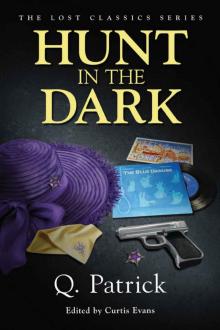 Hunt in the Dark
Hunt in the Dark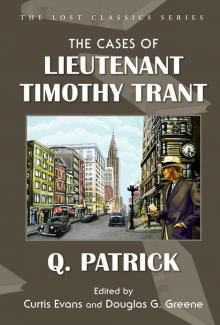 The Cases of Lieutenant Timothy Trant (Lost Classics)
The Cases of Lieutenant Timothy Trant (Lost Classics)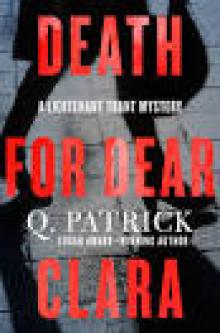 Death for Dear Clara
Death for Dear Clara S.S. Murder
S.S. Murder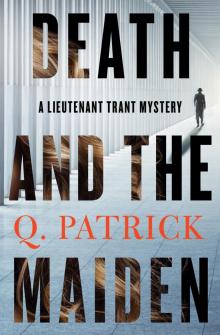 Death and the Maiden
Death and the Maiden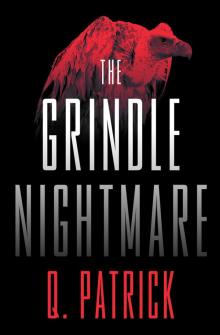 The Grindle Nightmare
The Grindle Nightmare Cottage Sinister
Cottage Sinister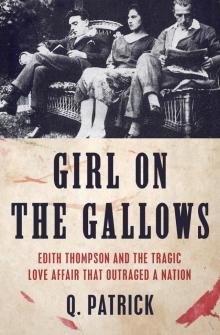 The Girl on the Gallows
The Girl on the Gallows